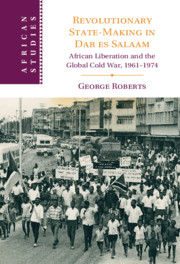Book contents
- Revolutionary State-Making in Dar es Salaam
- African Studies Series
- Revolutionary State-Making in Dar es Salaam
- Copyright page
- Contents
- Maps
- Acknowledgements
- Abbreviations
- Introduction
- 1 The Making of a Cold War City in Eastern Africa
- 2 Revisiting the Politics of the Arusha Declaration
- 3 Dilemmas of Non-Alignment: Tanzania and the German Cold War
- 4 The Assassination of Eduardo Mondlane: Mozambican Revolutionaries in Dar es Salaam
- 5 Tanzania’s ’68: Cold War Interventions, Youth Protest, and Global Anti-Imperialism
- 6 Decolonising the Media: Press and Politics in Revolutionary Dar es Salaam
- 7 Mwongozo: The African Revolution, Reloaded
- Conclusion
- Bibliography
- Index
- African Studies Series
2 - Revisiting the Politics of the Arusha Declaration
- Revolutionary State-Making in Dar es Salaam
- African Studies Series
- Revolutionary State-Making in Dar es Salaam
- Copyright page
- Contents
- Maps
- Acknowledgements
- Abbreviations
- Introduction
- 1 The Making of a Cold War City in Eastern Africa
- 2 Revisiting the Politics of the Arusha Declaration
- 3 Dilemmas of Non-Alignment: Tanzania and the German Cold War
- 4 The Assassination of Eduardo Mondlane: Mozambican Revolutionaries in Dar es Salaam
- 5 Tanzania’s ’68: Cold War Interventions, Youth Protest, and Global Anti-Imperialism
- 6 Decolonising the Media: Press and Politics in Revolutionary Dar es Salaam
- 7 Mwongozo: The African Revolution, Reloaded
- Conclusion
- Bibliography
- Index
- African Studies Series
Summary
This chapter explores the debates about the future of the Tanzanian state after independence, which culminated in the Arusha Declaration of 1967. It sets out the contours of elite-level conversations about development in the 1960s, as Tanzania groped for a path forwards that would translate independence into meaningful socio-economic progress. After showing how Julius Nyerere’s decision to embark on a radical programme of socialist reform was motivated by local unrest and the fate of postcolonial regimes elsewhere in Africa, it then revisits the little-understood politics of the Arusha Declaration and its fallout. Offering an alternative dimension to readings of Arusha as a stimulant for national unity, the chapter demonstrates how Tanzania’s socialist revolution created fissures among the political elite. In particular, it pushed Oscar Kambona, a prominent politician, into exile in Britain. The Arusha Declaration represented a critical turning point in Tanzania’s postcolonial history that narrowed space for dissent, while also sowing the seeds for future challenges to the TANU party-state.
- Type
- Chapter
- Information
- Revolutionary State-Making in Dar es SalaamAfrican Liberation and the Global Cold War, 1961–1974, pp. 66 - 99Publisher: Cambridge University PressPrint publication year: 2021

